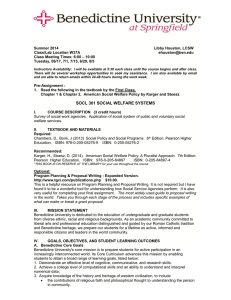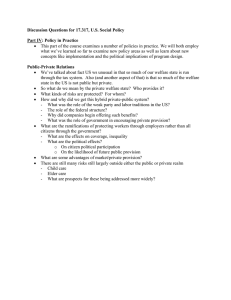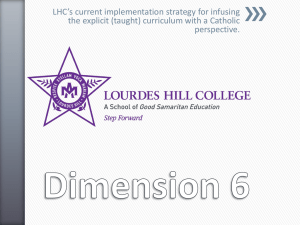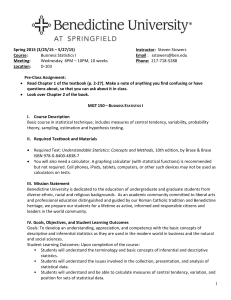Document 17998831
advertisement
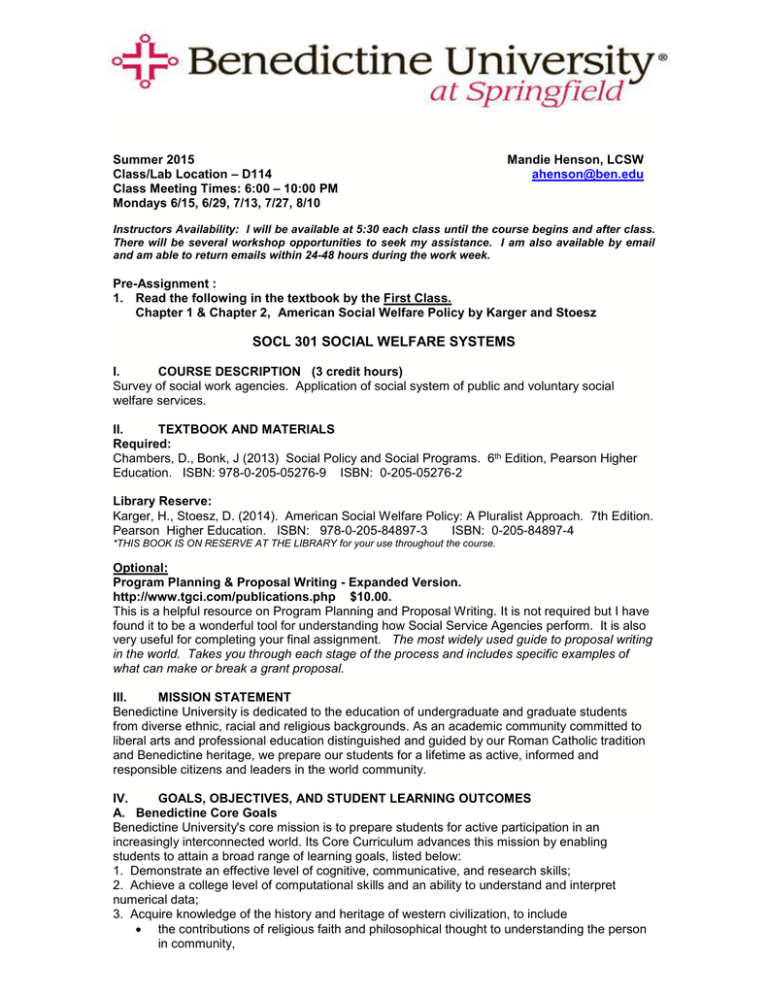
Summer 2015 Class/Lab Location – D114 Class Meeting Times: 6:00 – 10:00 PM Mondays 6/15, 6/29, 7/13, 7/27, 8/10 Mandie Henson, LCSW ahenson@ben.edu Instructors Availability: I will be available at 5:30 each class until the course begins and after class. There will be several workshop opportunities to seek my assistance. I am also available by email and am able to return emails within 24-48 hours during the work week. Pre-Assignment : 1. Read the following in the textbook by the First Class. Chapter 1 & Chapter 2, American Social Welfare Policy by Karger and Stoesz SOCL 301 SOCIAL WELFARE SYSTEMS I. COURSE DESCRIPTION (3 credit hours) Survey of social work agencies. Application of social system of public and voluntary social welfare services. II. TEXTBOOK AND MATERIALS Required: Chambers, D., Bonk, J (2013) Social Policy and Social Programs. 6th Edition, Pearson Higher Education. ISBN: 978-0-205-05276-9 ISBN: 0-205-05276-2 Library Reserve: Karger, H., Stoesz, D. (2014). American Social Welfare Policy: A Pluralist Approach. 7th Edition. Pearson Higher Education. ISBN: 978-0-205-84897-3 ISBN: 0-205-84897-4 *THIS BOOK IS ON RESERVE AT THE LIBRARY for your use throughout the course. Optional: Program Planning & Proposal Writing - Expanded Version. http://www.tgci.com/publications.php $10.00. This is a helpful resource on Program Planning and Proposal Writing. It is not required but I have found it to be a wonderful tool for understanding how Social Service Agencies perform. It is also very useful for completing your final assignment. The most widely used guide to proposal writing in the world. Takes you through each stage of the process and includes specific examples of what can make or break a grant proposal. III. MISSION STATEMENT Benedictine University is dedicated to the education of undergraduate and graduate students from diverse ethnic, racial and religious backgrounds. As an academic community committed to liberal arts and professional education distinguished and guided by our Roman Catholic tradition and Benedictine heritage, we prepare our students for a lifetime as active, informed and responsible citizens and leaders in the world community. IV. GOALS, OBJECTIVES, AND STUDENT LEARNING OUTCOMES A. Benedictine Core Goals Benedictine University's core mission is to prepare students for active participation in an increasingly interconnected world. Its Core Curriculum advances this mission by enabling students to attain a broad range of learning goals, listed below: 1. Demonstrate an effective level of cognitive, communicative, and research skills; 2. Achieve a college level of computational skills and an ability to understand and interpret numerical data; 3. Acquire knowledge of the history and heritage of western civilization, to include the contributions of religious faith and philosophical thought to understanding the person in community, the relationship of the individual to society: membership and participation in groups and institutions, 4. Develop an understanding of global society: cultural diversity, mutual relationships, interdependence of peoples and nations; 5. Apply liberal learning in problem-solving contexts as preparation for active participation in society; 6. Make informed ethical decisions that promote personal integrity, the legitimate rights and aspirations of individuals and groups, and the common good. B. Course Goals/Objectives/Outcomes As a course requirement within the degree program, SOCL 301 was designed with the above goals in mind. Thus, upon successful completion of this course, the student will be able to demonstrate mastery of the following objectives and student learning outcomes: 1. To understand how a social problem is addressed in relationship to social policy or program. 2. To understand the development of social problem analysis using a value-critical approach. 3. To use research methods to understand how social policy and programs come to be developed to address a social problem. 4. To put a face on welfare by interviewing welfare recipients and develop the ability to write and present orally the results. (communication skills) 5. To combine information learned in this class as a social policy analyst, address the creative task of analyzing a social problem and develop a strategy to build a social program or policy to address the issues. (problem solving skills) V. TEACHING METHODS/DELIVERY SYSTEM The classroom is a critical thinking and discussion community. This course is a combination of lecture, in-class discussion, in-class group assignments, multi-media, in-class presentations and formal evaluations. This class is very interactive. In order to complete the course successfully, students must come to class and must be prepared to discuss the reading assignments and to do the in-class work. The course also utilizes a course management system called Desire to Learn to deliver content and provide a virtual learning environment. You must have a working knowledge of the Course Management System known as Desire to Learn. The Resource Center will be able to provide you with any computer supplies and instruction necessary to complete the instructions for Week II. VI. COURSE REQUIREMENTS Students will complete assignments prior to the class discussion on those assignments to be better informed on the topics. Reading and class attendance will be necessary to prepare students for the field and research assignments in social policy analysis. One presentation is to be given. The project is a group lecture presentation and an individual portfolio of a social agency which has chosen to address the social issues in their service area. Attendance Policy This course is highly accelerated, and students will need to take a great deal of responsibility for their own learning outcomes. Attendance is required in each class meeting for the full period of time. Any absence must be due to extraordinary circumstances and will require documentation for it to be considered excused. Documentation must be provided immediately in order to determine what, if any, accommodations are reasonable or possible. Class attendance will directly impact your final grade, and each undocumented absence will be considered unexcused and will result in a 20% reduction in the final grade for the course. Due to the accelerated nature of the course, should you experience a medical condition which prevents you from attending any class(es), appropriate medical documentation must be provided immediately in order to determine what, if any, accommodations are reasonable or possible. -Notifying the instructor that you will not be able to attend or will be late is considered a professional courtesy. -You will need to make arrangements with a classmate to collect handouts and review notes. -Showing up more than fifteen minutes late to class for any reason will result in half an absence. -If you miss the equivalent of two full classes or more, you will be asked to retake the course. Benedictine University at Springfield Student Academic Honesty Policy The search for truth and the dissemination of knowledge are the central missions of a university. Benedictine University at Springfield pursues these missions in an environment guided by our Roman Catholic tradition and our Benedictine heritage. Integrity and honesty are therefore expected of all University students. Actions such as cheating, plagiarism, collusion, fabrication, forgery, falsification, destruction, multiple submission, solicitation, and misrepresentation are violations of these expectations and constitute unacceptable behavior in the University community. Student’s Responsibility Though there is no formal honor code at Benedictine University at Springfield, students are expected to exhibit academic honesty at all times. Violations against academic honesty are always serious and may result in sanctions that could have profound long-term effects. The final responsibility for understanding the Academic Honesty Policy of the institution, as well as the specific policies for individual courses normally found in syllabi, rests with students. If any doubt exists about what constitutes academic dishonesty, students have the responsibility to talk to the faculty member. Students should expect the members of their class to be academically honest. If students believe one or more members of the class have been deceitful to gain academic advantage in the class, students should feel comfortable to approach the faculty member of the course without prejudice. Violations of the Academic Honesty Policy will be reported to the Office of the Dean of Academic Affairs. Along with a verbal warning, the following are consequences a student may face for academic dishonesty: a failing grade or “zero” for the assignment; dismissal from and a failing grade for the course; or dismissal from the Institution. VII. MEANS OF EVALUATION Assignment #1: Group Class Discussion “The Voluntary and For-Profit Social Sectors: Due Week II in class 10 Points: Instructions provided in class. Assignment #2: Defining a Social Issue Group Presentation along with The Four Elements of Defining a Problem Outline Report (two person group) Due Week III in class Handout provided during first class 40 Points: See Rubric attached to instructions Assignment #3: Agency Analysis Due Week V in class Individual Project 50 Points: See Rubric attached to instructions GRADING SCALE: A = 100 to 90%, B=89 to 80%, C=79 to 70%, D=69 to 60%, F=59% or below. Follow D2L Grade book for Scale point value. Grade Appeal Process If a student believes that an error has been made in reporting a grade, an appeal must be made in writing to the instructor and must be initiated within 60 calendar days after the end of the term for which the grade in question was reported. The appeal should contain specific information about why it is believed the grade reported is inaccurate. See the Student Handbook for additional details. Add/Drop Dates Please refer to the current Academic Calendar for add/drop dates. Incomplete Request To qualify for an “I” grade, a minimum of 75% of the course work must be completed with a “C” or better, and a student must submit a completed “Request for an Incomplete” form to the Registrar’s Office. The form must be completed by both student and instructor, but it is the student’s responsibility (not the instructor’s) to initiate this process and obtain the necessary signatures. Student Withdrawal Procedure It is the student’s responsibility to officially withdraw from a course by completing the appropriate form, with appropriate signatures, and returning the completed form to the Advising Office. Please refer to the Student Handbook for important financial information related to withdrawals. VIII. TOPICAL COURSE OUTLINE Week I Social Problems This week’s study will include creating the context for social policy and critically studying social “problems” o This week will include Chapter 1 of the required text. Through a combination of course discussions, required reading, lectures and videos the following topics will be discussed. Please expect to spend at least 3 hours per week during self study in addition to the four hour class. The nature of the social problem (Historical Approaches) The Four Elements of Defining a Problem - Social Problem analysis (Lecture) o Required Reading and Video. Pages 7-25 of the require text (Chambers & Bonk) Richard Wilkinson: How economic inequality harms societies. Watch this video at http://www.ted.com/talks/richard_wilkinson.html Week II: Social Policy (this study tends to spill into Week III & IV as we work on our Defining the issue assignment #2) This week’s lessons will study how social problems give press to social policy and the efforts made to alleviate the issues pressing our society. o This week will include Chapter 2-8 of the required text (Chambers & Bonk). Through a combination of course discussions, required reading, lectures and videos the following topics will be discussed. Please expect to spend at least 810 hours per week during self study. Six fundamental Policy Elements Goals and Objectives for policy Benefits and Services Eligibility Service delivery and program design o Required Reading. (this reading is for week II & III but will need to be completed before completing presentation for assignment #2) Pages 29-164 of the required text (Chambers & Bonk) o DISCUSS: Group Discourse. (10 points) DUE: Assignment #1: Discussion “The Voluntary and For-Profit Social Sectors Week III: Presentation Group Projects Learning Objectives for Module III: This week we will have the opportunity to focus on the tools to defining a social problem. It is critical that we apply the concepts of social welfare policies to the events of today that society sees as perceived social issues. o Through group presentations we will learn how social problems are transformed into social programs. o No Required reading for this week. o Course Learning Objectives: To understand the development of social problem analysis using a valuecritical approach. To use research methods to understand how social policy and programs come to be developed to address a social problem. To put a face on welfare by interviewing welfare recipients and develop the ability to write and present orally the results. (communication skills) To combine information learned in this class as a social policy analyst, address the creative task of analyzing a social problem and develop a strategy to build a social program or policy to address the issues. (problem solving skills) o DUE: Assignment #2: Defining a Social Issue Group Presentation along with The Four Elements of Defining a Problem Outline Report (two person group) -40 points Week IV: Social Programs o o This week’s lessons will focus on how social welfare programs are solutions to social problems and how we can outline their services to learn how they effectively solve social issues through policy and performance. Through a combination of course discussions, lectures and videos the following topics will be discussed. The Child Welfare State (podcast) “To The End of June,” author Chris Beam casts a searing eye on the labyrinth that is the American foster care system. http://onpoint.wbur.org/2013/08/29/foster-care (we will listen to this in-class and discuss) Globalization Welfare Policy Week V: Wrapping up Presentations and Guest Speaker o o Guest Speaker: TBA – DCFS Policy Due: Assignment #3: Agency Analysis and Presentation– 50 points IX. AMERICANS WITH DISABILITIES ACT (ADA) Benedictine University at Springfield provides individuals with disabilities reasonable accommodations to participate in educational programs, activities, and services. Students with disabilities requiring accommodations to participate in campus-sponsored programs, activities, and services, or to meet course requirements, should contact the Resource Center as early as possible: springaccess@ben.edu or (217) 717-9253. X. ASSESSMENT Goals, objectives, and learning outcomes that will be assessed in the class are stated in this syllabus. Instructor will use background knowledge probes, one-minute papers, reflective essays and/or other Classroom Assessment Techniques as deemed necessary in order to provide continuous improvement of instruction.
